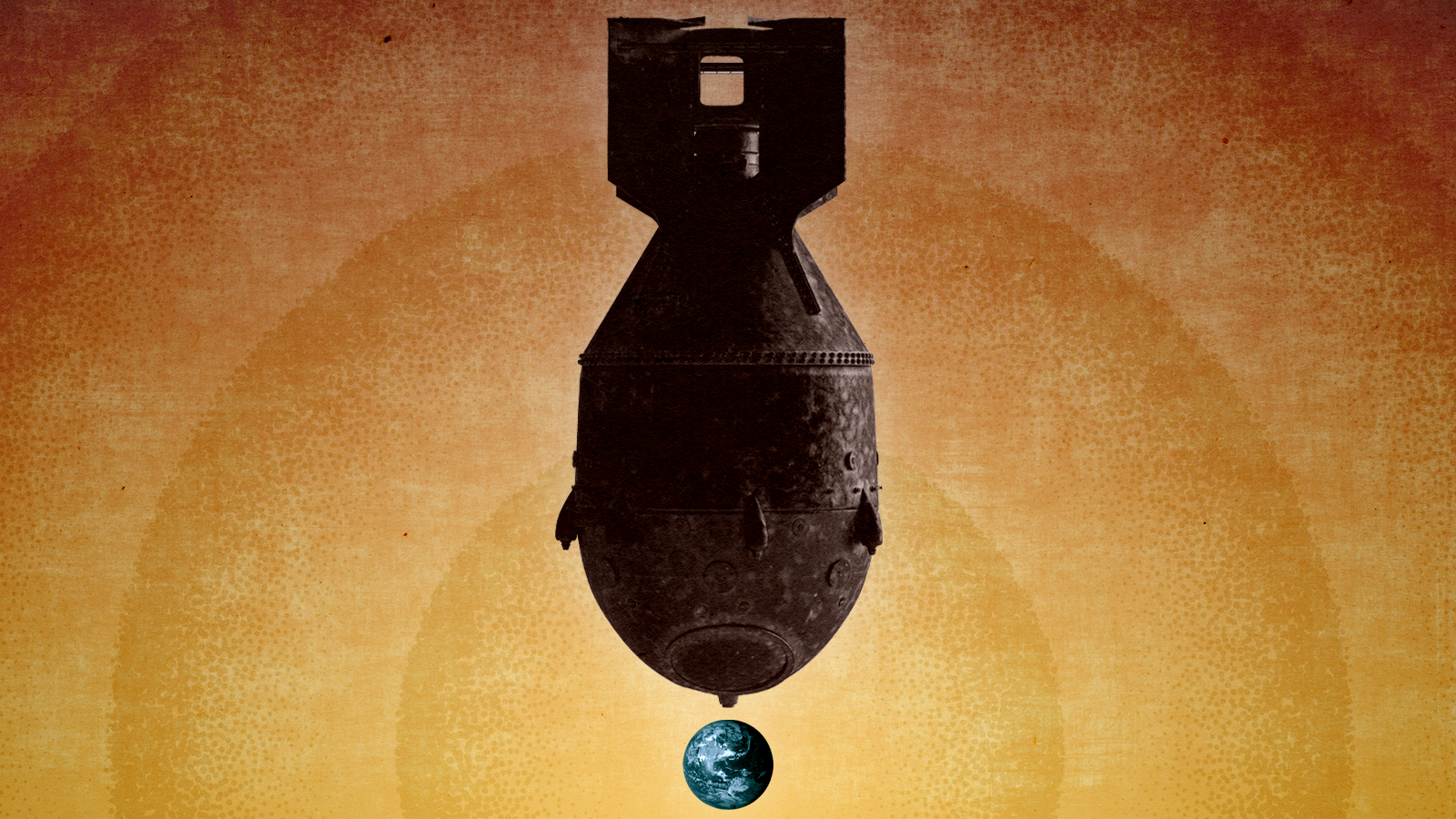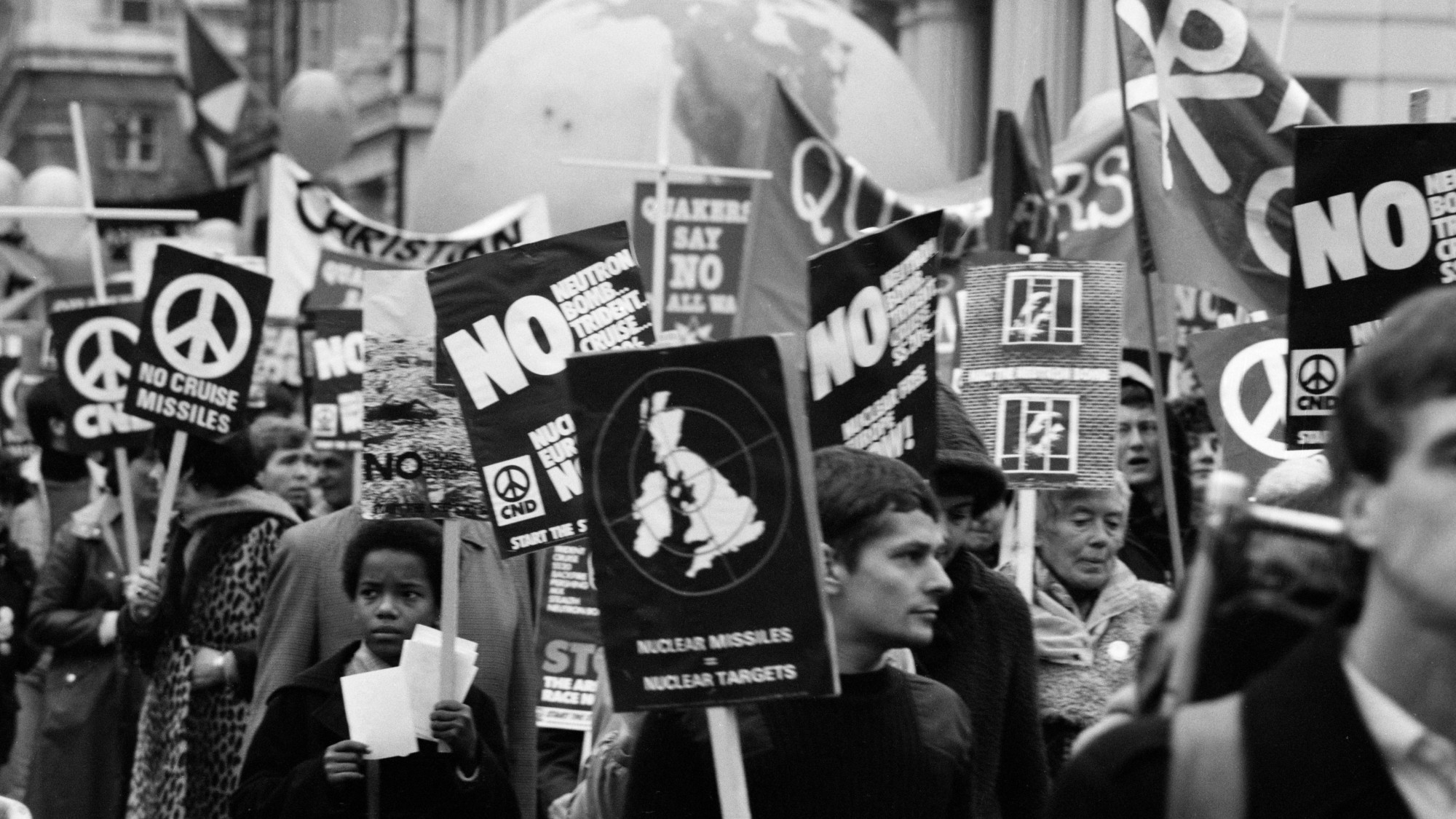Precarious precedents for Putin's nuclear threats
Putin makes threats and Biden warns of Armageddon. We've been here before.


A free daily email with the biggest news stories of the day – and the best features from TheWeek.com
You are now subscribed
Your newsletter sign-up was successful
Is it the end of the world as we know it? Not quite, but Russian President Vladimir Putin's threat to use nuclear weapons in Ukraine means the world is in a moment more dangerous than any since the end of the Cold War three decades ago. President Biden is sounding the alarm. "We have not faced the prospect of Armageddon since Kennedy and the Cuban Missile Crisis," Biden said at a Democratic fundraiser last week. He later added: "I don't think there's any such thing as the ability to easily use tactical nuclear weapons and not end up with Armageddon."
If Putin does use nukes, it would break the "nuclear taboo" — an informal proscription on the use of such fearsome weapons that has emerged since they were last (and first) used by the United States at Hiroshima and Nagasaki in 1945. "Since its rise during the Cold War, the nuclear taboo has been embraced by the United Nations and by leaders and publics around the world as a norm of international politics," Brown University's Nina Tannenwald wrote in 2018. But that taboo has nearly been broken several times. The Cuban Missile Crisis is the most famous example of this — but it's not the only one. Here are some other times when the world hovered on the precipice:
The Korean War
When Dwight Eisenhower arrived at the White House in 1953, it was on the strength of a promise to end the Korean War. He'd decided to do so by any means necessary — including atomic means. "President Eisenhower, in his memoirs, said he came into office prepared to use them, if necessary, to break the deadlock" in the war, The New York Times reported more than 30 years later.
The Week
Escape your echo chamber. Get the facts behind the news, plus analysis from multiple perspectives.

Sign up for The Week's Free Newsletters
From our morning news briefing to a weekly Good News Newsletter, get the best of The Week delivered directly to your inbox.
From our morning news briefing to a weekly Good News Newsletter, get the best of The Week delivered directly to your inbox.
By the early 1950s, though, the nuclear taboo was already in place — an obstacle to Ike's plans to force an end to the war. Members of the administration wrestled with how to get around that taboo: Notes from a March 1953 meeting of the National Security Council, members agreed "that somehow or other the taboo which surrounds the use of atomic weapons would have to be destroyed." So why weren't they used? Officials weren't sure they'd actually end the war. ''Personally, I am very skeptical about the value of using atomic weapons tactically in Korea," Gen. J. Lawton Collins, the Army Chief of Staff, said in a memorandum. In the end, nukes weren't needed: An armistice was signed in July 1953.
The Nixon presidency
Richard Nixon's presidency is best-remembered for ending with his resignation over the Watergate scandal. By the end, his advisers were terrified that he might unilaterally start an international incident. In the final days of his presidency, Defense Secretary James Schlesinger gave orders that if "the president gave any nuclear launch order, military commanders should check with either him or Secretary of State Henry Kissinger before executing them," Garrett M. Graff wrote for Politico in 2017. The defense secretary worried that Nixon — depressed and often drunk — "might order Armageddon."
But even in the earlier, less chaotic years of his presidency, Nixon considered using nukes. After serving as Ike's vice president, he came to office in 1969 promising to end the Vietnam War — and, like his predecessor, thought a mushroom cloud might bring a quick end to the conflict. But, he later told Time, he ultimately decided that "massive escalation would have destroyed any chances for moving forward with the Soviets and China" amidst the Cold War. But that wasn't the only time Nixon considered using nuclear weapons. Other times: The Arab-Israeli war in 1973, a later Soviet-China border dispute, and the 1971 China-Pakistan war.
'We begin bombing in five minutes'
What if a nuclear war started for a really dumb reason? President Ronald Reagan tested that proposition in 1984, during a mic check for his weekly radio address to the nation. "My fellow Americans, I'm pleased to tell you today that I've signed legislation that will outlaw Russia forever," he said. "We begin bombing in five minutes."
A free daily email with the biggest news stories of the day – and the best features from TheWeek.com
Reagan was joking. But that wasn't so obvious to the Soviets. The military briefly went on high alert — which reportedly caused U.S. and Japanese forces to go on alert as well. The Kremlin said in a statement that the president's joke signaled his opposition to peace between the two countries: "This conduct is incompatible with the high responsibility borne by leaders of states, particularly nuclear powers." Three years later, though, Reagan and Soviet leader Mikhail Gorbachev signed the INF Treaty, which banned both countries from possessing or developing intermediate-range nuclear weapons.
The closest call
A year before Reagan's radio joke, another accident nearly led to nuclear war. In September 1983, the Soviet Union's early-warning system sounded the alarm that the United States had launched a nuclear missile at the country. That hadn't actually happened: A Soviet satellite misread the reflection of the sun off clouds over the area it was monitoring.
Why didn't the Soviets respond with a launch of their own? Because the officer in charge — Lt. Col. Stanislav Petrov — suspected a false alarm. He was right, and because of that millions of people in both the United States and Soviet Union were spared fiery deaths. "I was just at the right place at the right time," Petrov said in a documentary about the incident. But the incident offers a chilling lesson: When tensions between nuclear powers are on the rise, sometimes a bit of luck — the right person being in the right place at the right time — is the difference between peace and Armageddon. Will our luck keep holding?
Joel Mathis is a writer with 30 years of newspaper and online journalism experience. His work also regularly appears in National Geographic and The Kansas City Star. His awards include best online commentary at the Online News Association and (twice) at the City and Regional Magazine Association.
-
 Political cartoons for February 21
Political cartoons for February 21Cartoons Saturday’s political cartoons include consequences, secrets, and more
-
 Crisis in Cuba: a ‘golden opportunity’ for Washington?
Crisis in Cuba: a ‘golden opportunity’ for Washington?Talking Point The Trump administration is applying the pressure, and with Latin America swinging to the right, Havana is becoming more ‘politically isolated’
-
 5 thoroughly redacted cartoons about Pam Bondi protecting predators
5 thoroughly redacted cartoons about Pam Bondi protecting predatorsCartoons Artists take on the real victim, types of protection, and more
-
 What is ‘Arctic Sentry’ and will it deter Russia and China?
What is ‘Arctic Sentry’ and will it deter Russia and China?Today’s Big Question Nato considers joint operation and intelligence sharing in Arctic region, in face of Trump’s threats to seize Greenland for ‘protection’
-
 New START: the final US-Russia nuclear treaty about to expire
New START: the final US-Russia nuclear treaty about to expireThe Explainer The last agreement between Washington and Moscow expires within weeks
-
 What would a UK deployment to Ukraine look like?
What would a UK deployment to Ukraine look like?Today's Big Question Security agreement commits British and French forces in event of ceasefire
-
 The history of US nuclear weapons on UK soil
The history of US nuclear weapons on UK soilThe Explainer Arrangement has led to protests and dangerous mishaps
-
 Did Trump just end the US-Europe alliance?
Did Trump just end the US-Europe alliance?Today's Big Question New US national security policy drops ‘grenade’ on Europe and should serve as ‘the mother of all wake-up calls’
-
 Is conscription the answer to Europe’s security woes?
Is conscription the answer to Europe’s security woes?Today's Big Question How best to boost troop numbers to deal with Russian threat is ‘prompting fierce and soul-searching debates’
-
 Trump peace deal: an offer Zelenskyy can’t refuse?
Trump peace deal: an offer Zelenskyy can’t refuse?Today’s Big Question ‘Unpalatable’ US plan may strengthen embattled Ukrainian president at home
-
 Vladimir Putin’s ‘nuclear tsunami’ missile
Vladimir Putin’s ‘nuclear tsunami’ missileThe Explainer Russian president has boasted that there is no way to intercept the new weapon
